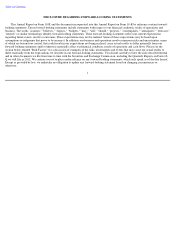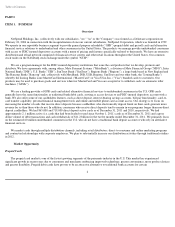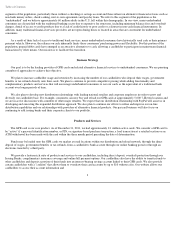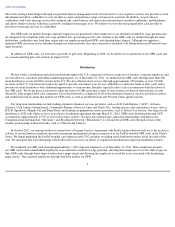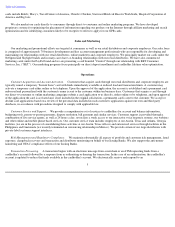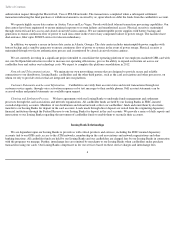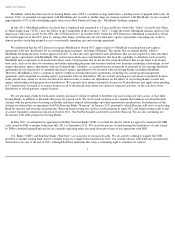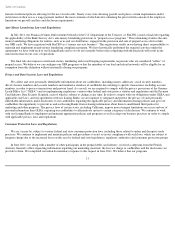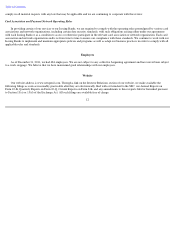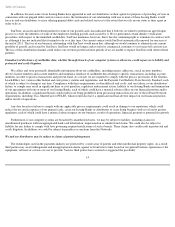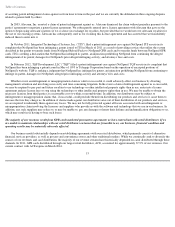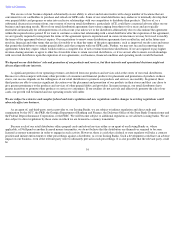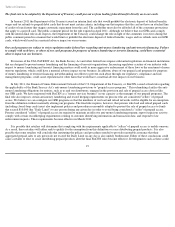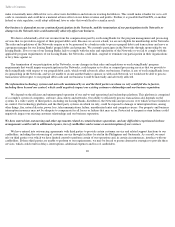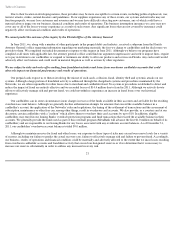NetSpend 2011 Annual Report Download - page 15
Download and view the complete annual report
Please find page 15 of the 2011 NetSpend annual report below. You can navigate through the pages in the report by either clicking on the pages listed below, or by using the keyword search tool below to find specific information within the annual report.
Table of Contents
formal or informal policies allowing for the use of such cards. Nearly every state allowing payroll cards places certain requirements and/or
restrictions on their use as a wage payment method, the most common of which involve obtaining the prior written consent of the employee,
limitations on payroll card fees and disclosure requirements.
Anti
-Money Laundering Laws and Regulations
In July 2011, the Financial Crimes Enforcement Network of the U.S. Department of the Treasury, or FinCEN, issued a final rule regarding
the applicability of the Bank Secrecy Act's anti-money laundering provisions to "prepaid access programs." This rulemaking clarifies the anti-
money laundering obligations for entities, such as us and our distributors, engaged in the provision and sale of prepaid access devices like
our GPR cards. We have registered with FinCEN as a "money services business." This registration results in our having direct responsibility to
maintain and implement an anti-money laundering compliance program. We have historically performed the required activities under the
agreements we have with each of our Issuing Banks and so we do not currently believe that complying with the final rule will result in any
material increase in our costs of operations.
The final rule also imposes certain anti-money laundering and record keeping requirements on persons who are considered "sellers" of
prepaid access. We believe we can configure our GPR programs so that the members of our load and reload networks will be eligible for an
exemption from this definition without materially altering our programs.
Privacy and Data Security Laws and Regulations
We collect and store personally identifiable information about our cardholders, including names, addresses, social security numbers,
driver's license numbers and account numbers and maintain a database of cardholder data relating to specific transactions, including account
numbers, in order to process transactions and prevent fraud. As a result, we are required to comply with the privacy provisions of the Gramm-
Leach-Bliley Act ("GLBA") and its implementing regulations, various other federal and state privacy statutes and regulations and the Payment
Card Industry Data Security Standard, each of which is subject to change at any time. In order to comply with our obligations under GLBA and
applicable state laws, and our agreements with our Issuing Banks, we are required to safeguard and protect the privacy of such personally
identifiable information, make disclosures to our cardholders regarding the applicable privacy and information sharing policies and give our
cardholders the opportunity to prevent us and our Issuing Banks from releasing information about them to unaffiliated third parties for
marketing and other purposes. The privacy laws of certain states, including California, impose more stringent limitations on access and use of
personal information than GLBA, requiring our cardholders to affirmatively opt-in to certain categories of disclosures. We continue to work
with our Issuing Banks to implement and maintain appropriate policies and programs as well as adapt our business practices in order to comply
with applicable privacy laws and regulations.
Consumer Protection Laws and Regulations
We are, or may be, subject to various federal and state consumer protection laws, including those related to unfair and deceptive trade
practices. We continue to implement and maintain policies and procedures to assist us in our compliance with such laws, which are subject to
frequent change due to the increased focus on this area by federal and state legislatures, regulatory authorities and consumer protection groups.
In June 2011, we, along with a number of other participants in the prepaid debit card industry, received a subpoena from the Florida
Attorney General's office requesting information regarding our marketing materials, the fees we charge to cardholders and the disclosures we
provide to them. We completed our initial documentary response to this request in June 2011. We believe that our programs
11


